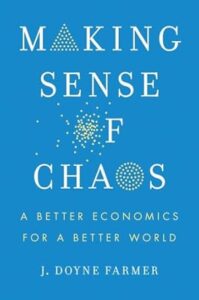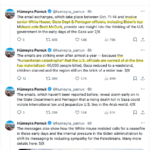Doyne Farmer’s recent conversation with Econ Talk’s Russ Roberts gave listeners an insight into the current state of economics and how mainstream economists model market behavior and use their models and tools to predict behavior. , got me thinking about how to identify trends. After listening to the EconTalk episode, “The Economics of Chaos and Complexity (co-authored with J. Doyne Farmer)” Do you agree?
In this podcast, Roberts and Farmer delve into the realm of complexity economics, with Farmer making a strong case for its potential to greatly enhance the way economists model and predict market behavior and trends. Farmer argues that it makes sense to move away from the overly simplistic rational expectations model. He advocates opening our eyes to the complex and interconnected realities of the economic world. Yes, it sure does sound like heavy lifting. However, Farmer makes a compelling case for complexity economics and its use of agent-based modeling.

Roberts and Farmer make the economics of complexity comprehensible to people outside of Farmer’s field, especially those outside the field of economics and those who call themselves armchair economists.
At around 22:26 in the podcast, Farmer explains how complexity economics can incorporate more realistic and nuanced aspects of human behavior into agent-based modeling. He provides an example to illustrate using how house prices are set through aspiration level adaptation. Complexity economists acknowledge the heterogeneity of individuals and the diversity of decision-making strategies. This is very different from the assumption of rational expectations of homogeneous actors seeking to maximize utility in the neoclassical model with identical income constraints.
This shift allows the work of complexity economists to bring the discipline of economics closer to the nuances of real life and systematically introduce rules of thumb and social institutions into decision-making that are difficult to do in most economic models. It now looks like this. Around 24:00, some of the differences between the work of complexity economists and econometricians are discussed by Farmer and shared with Roberts. Farmer here discusses the benefits of using complexity economics to analyze problems. 2008 financial crisishighlights the possible benefits of harnessing complexity economics to inform policy responses to stem the aftermath. Mr. Roberts disagreed and encouraged Mr. Farmer to consider other possibilities. Farmer appears determined to adopt centralized policies rather than trusting in decentralized markets and the people who make them up.
Farmer employs a heterogeneous approach to complexity economics and its real-world dynamics, complemented by the use of big data and powerful advanced computing, to strengthen economics and perhaps move mainstream economics closer to consumption. It continues to make a convincing case that it will help us recalibrate the way we model. Savings and investment behavior. Now, explain why Farmer argues that this disparate approach is a major advantage, especially when considering demographics, income differences, random behavioral adjustments, and other factors.
From Farmer’s perspective, complexity economics means that economic models become clearer, more broadly applicable, and more adept at scrutinizing both the direct and indirect effects of different policies. It could serve as a path to a future with economics to better navigate social and global complexity. event. Yes, this provides a framework that creates a compelling vision and vastly improves the way we understand economic dynamics, especially when accompanied by increased predictive power. As an example, Mr. Farmer said he and his team use unexpected global crises like the recent pandemic to predict how consumers, businesses, and industries will react. Let me explain how I approached it. He cited the team’s experience with COVID-19 in the UK.
Indeed, the integration of complexity economics may create fertile ground for interdisciplinary collaboration and provide a playground for new institutional economics, strengthening models with empirical evidence and providing paradigms for economic thought. It may lead to a shift. This push for a more comprehensive and understandable economic science is laudable and is consistent with a broader desire across the field to make economics more accessible and actionable for a broader cross-disciplinary audience. . That’s all there is to it. very It’s fascinating. But there is always a “but”, especially in those circles of us that are committed to the ideal of a society of free and responsible individuals.
As free market economists delve deeper into how to inform policymakers about the results of Farmer’s complexity economics, there is certainly the potential for serious conflict. Yes, there is always the possibility of this conflict. But Farmer doesn’t seem to know much about it. FA HayekThis is the work of . From start to finish, Hayek is not mentioned in his book, nor is Hayek discussed on this or any other popular podcast. Moreover, he doesn’t seem to fully understand milton friedman‘s place in the impressive record of self-interested The abysmal record of market-hopping individuals and “well-meaning” government officials and policy makers. In fact, he appears to be somewhat hostile to Friedman and his cadre of Chicago School economists.
~106 pages, Understanding chaos: better economics for a better world.
Yes, Milton Friedman, or F.A. Hayek, not mentioned by Farmer, is famous for his defense of free market principles. How will they react to Farmer’s claims? I can only guess that they will react, but they will react differently. Perhaps both will be intrigued by his scientific approach and his ability to use “decentralized” heuristics as a key part of his decision-making behavior. However, I agree with Friedman’s insistence that the modeling scenarios used by Farmer incorporate the strengths of minimal government intervention and free market self-regulation to provide a balanced perspective. Or do you think he will push something else? We now turn to Hayek to emphasize the distributed nature of knowledge and the potential dangers of central planning. How do you imagine he would criticize Farmer’s approach? What suggestions would he make to Farmer?
If Farmer uses this agent-based model primarily for the sole purpose of designing policies to address important social problems, Friedman and Hayek argue that its effectiveness You may have doubts. However, if it is possible to use his model to investigate the ultimate effects, such as securing property rights, improving the legal system, promoting stable money, and improving capital markets, Friedman and Hayek Can we see them as leaning towards Farmer’s model? Proponents of minimal intervention rely on complexity economists like Farmer to suggest the natural equilibrium that dynamic economies gravitate toward through free interaction. might encourage us to explore and compare our results with those produced by more policy-oriented Keynesians.
So, I would like to ask you one last question. Can complexity models provide valuable insights into resolving the debate over whether a free market with limited government or a government that tries to dictate policy serves society better? Moving forward will take great strides in reconciling different economic paradigms, and understanding how society is harmed by both market forces supported by decentralized systems and government policies generated by centralized systems. , would emphasize the need to understand who is being hurt.
Let’s ask what you think. Think about the questions below and share your answers now.
- After listening to this episode, the conversation between Farmer and Russ Roberts will give you some insight into the current state of economics, especially why mainstream economists should take seriously the way they model, predict, and identify trends in market behavior. Do you agree to give us the? Please explain your answer.
- At around 22:26 in the podcast, Farmer explains how complexity economics brings more realistic and nuanced aspects of human behavior to agent-based modeling (ABM), as seen in setting house prices through aspiration-level adaptation. It explains how to integrate it. Compare this ABM approach to representative agent decision-making, which is used to quickly resolve market corrections in response to disruptions and imbalances.
- Around the 24:00 mark, Farmer discusses the differences between the work of complexity economists and econometricians with Roberts. How do you compare and contrast the strengths and weaknesses of each approach, especially in the context of the 2008 financial crisis?
- Farmer explains why the heterogeneous approach of complexity economics is complemented by big data and advanced computing to capture real-world dynamics, especially in recalibrating the modeling of consumption, savings, and investment behavior. Does it claim to be of great benefit to mainstream economics? Account demographics, income differences, random behavioral adjustments, and other factors?
- Given the claimed benefits of complexity economics in making economic models clearer, more widely applicable, and able to assess the direct and indirect effects of policies, this approach is How has it proven to be helpful during a viral outbreak? Take a look at the skepticism expressed in comments posted on this topic. Given the US experience with this model, what would you do to further the discussion?
- Complexity economists like Farmer have great faith in the government’s ability to strategize and implement policy without falling prey to special interests, myopia, and ill-informed voting. Can we use this framework to consider and consider policies that increase economic freedom?
- To what extent can a complexity economics approach to modeling the world be used to resolve the debate over whether economic freedom or central planning through policy is better for human flourishing?
(Editor’s note: Don’t miss Ferrarini discussing Farmer’s book with David Henderson and Arnold Kling This episode of the “From the Shelf” series. )
Tawni Hunt Ferrarini is an economist, international economics educator, and author currently based at the Stavros Center for Free Enterprise at Florida State University, where she is a Freedom Fund scholar in residence this semester.







